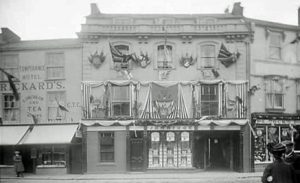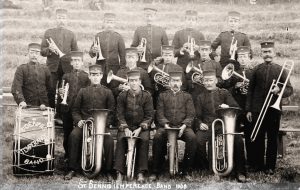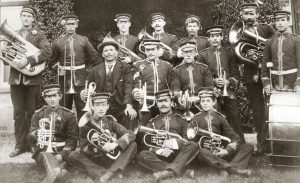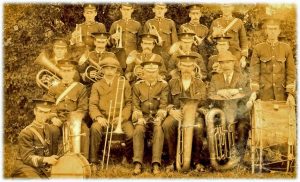
Teetotalism is the abstinence from alcoholic beverages and in this article, Tony Mansell considers how it impacted on brass bands. To begin, however, he reflects on the origin and growth of the temperance movement.
The temperance movement had its beginnings in Preston where a society was founded in 1833 by social reformer, local politician, writer, and newspaper proprietor, Joseph Livesey. He became one of the leaders of the movement and was the author of “The Pledge” which stated: “We agree to abstain from all liquors of an intoxicating quality whether ale, porter, wine or ardent spirits, except as medicine”.
Abstinence was not limited to the temperance societies: the call was taken up by many organisations including religious groups which, here in Cornwall, included many non-conformists sects.
To begin, temperance groups had only required their members to abstain from spirits as beer at that time was viewed as less of a threat and certainly purer than the water supply. The Beerhouse Act of 1830 allowed anyone to sell beer and there followed an explosion of beerhouses across the country. In response to what seemed like encouragement from the government, even the consumption of beer was soon frowned on and within a few years there were calls for the total abstinence from all intoxicating liquors.
As an alternative to alehouses, and to support those who agreed to abstain, temperance hotels and coffee shops began to appear in our towns. There, the adherents could socialise with no exposure to alcohol.
 To the left is Rickards Temperance Hotel, one of a number of such establishments in Truro
To the left is Rickards Temperance Hotel, one of a number of such establishments in Truro
It may be a surprise to learn that the Wesleyan Methodists were initially anti-teetotal and this newspaper report from 1820 clearly shows the popularity of ale as a refreshing drink. “Sunday school officers resolved that at the annual tea treat each scholar should, among other things, be served a cup of beer”. They argued that teetotal advocacy could have a divisive effect upon societies as zealous abstainers demanded the exclusion of Methodist liquor dealers.
Other strands of the Methodist Church either adopted teetotalism or were founded on its principles. This included the Primitive Methodists and at their 1832 Conference they supported temperance. The Primitives subsequently played a significant part in the movement, assisting organizations such as the Independent Order of Rechabites and the Band of Hope Union. Despite this stand, the Redruth Primitive Circuit Quarterly Meeting in March 1833 passed a resolution, “That a pint of beer and a pennyworth of bread be allowed to every preacher planned at Three Burrows [Primitive Chapel]”.
The 1841 Wesleyan Conference condemned teetotalism and prohibited teetotal meetings on chapel premises but this came with its own problems as this exchange at the little mining village of Mount Hawke shows when a prominent temperance lecturer was asked to speak in the chapel. An announcement of the meeting was made from the pulpit in the usual way and when the Minister heard about it, he confronted the brother who had arranged the meeting.
Minister: “I understand that you have announced a Temperance address for next week in the chapel.”
Brother: “I have”.
Minister: “It must not take place. I forbid the use of the chapel for such a purpose. I shall lock the door.”
Brother: “The meeting will take place and if you lock the door, I shall burst it open.”
The meeting was held and proved to be the first of many.
Views polarised and in 1842, Jonathan Turner, the St Ives Wesleyan Superintendent described teetotallers as “…cowardly and paltry imbeciles”. Elsewhere they were referred to as “Half-mad, incendiary quacks in morals”. Not all Wesleyans agreed with the official view, however, and the biggest secession from Wesleyanism over the temperance question was in the St Ives circuit when in the early 1840s, 600 Cornish Wesleyans formed “The Teetotal Wesleyan Methodists”.
Cornish historian Ashley Rowe referred to the “Teetotal Village” in one of his articles for the “West Briton” when he said that the movement came to Mount Hawke in the 1850s. Miners returning from America, the old forty-niners, had joined the Rechabites and wished to have a lodge in their home village. At that time, the Wesleyans were still undecided in their attitude towards the movement and matters came to a head when the chapel authorities refused to admit the banners and insignia of the Rechabites. This opposition strengthened the resolve of the teetotal movement and it became all the stronger. Mr Rowe wrote, “The public-house, the Red Lion Inn, closed its doors and although some beer-shops or kiddley-winks held out for a while, they too had to disappear.” By 1863 there was not an inn left in the village. The “West Briton” of the 6th November 1863 provided an account of this Temperance victory. “The last representative of John Barleycorn also practised the cobbling art but by some means or other, mine host found that leathering the sole and running the spirit was an unprofitable calling. From the best authorities upon the matter we learn that the evil eye of blue ruin was upon the house and the unlucky cobbler escaped from the malevolence of the monster by striking his colours in the night and hoisting ‘Mr… shoemaker’ the next morning. Since the occurrence of that interesting circumstance, no one has had the temerity to beard the ‘Bogie’ and things still remain in status quo.”
The movement flourished for many years, but its appeal gradually declined, and societies closed. Perhaps, the acceptance of moderation in drinking habits made them unnecessary: perhaps they had achieved their aim.
In the chapels, however, people continued to be invited to “sign the pledge” and in the 1950s, at a very young age, I succumbed when a very verbose Methodist minister with a huge white beard issued the “invitation”. I well remember my parent’s annoyance. Not because they objected in principle but because they considered me far too young to make the choice.
Nowadays, alcohol is not allowed in Methodist chapels, but most members consider it a matter of personal morality whether or not they abstain.
******
Playing a brass instrument is thirsty work and the attraction of relaxing in the alehouse for a drink after a rehearsal or a concert must have been compelling for the early bandsmen. Players soon gained a reputation for enjoying a tipple. Despite this, however, many bands became attracted to the temperance movement and formed long associations with those who rejected the demon drink. This must have delighted those who flew the teetotal banner as it helped carry the message to the public.
The history of the Cornish brass band movement shows that many bands made the emphatic statement by adding the word temperance to their names. It is probable that most were genuine in declaring their abstinence from alcohol, but it seems that a few took advantage of the connection when seeking bookings from the many teetotal organisations of the time. Whatever the motivation in becoming a “temperance band” it is clear that it had advantages for the ones which did although there are many examples where bands resisted the change in name and were still used by temperance societies.
In 1853 Redruth and Porter Band paid the price when it was not chosen to play at a Grand Teetotal Demonstration held at the home of Michael Williams at Trevince. The procession was led by Camborne Brass Band and it was suggested that the inclusion of “Porter” in their name made the Redruth band unsuitable.
 St Dennis Band, a temperance band from circa 1900 and for about 20 years
St Dennis Band, a temperance band from circa 1900 and for about 20 years
In July 1856, the Penzance and Truro Teetotal Demonstration was held at Tehidy: Penzance Band, Godolphin Teetotal Band, Camborne Band, Truro Band (Emidy’s) and Redruth Band were in attendance. By then, the word “Porter” had been removed from Redruth Band’s title! This was a huge event with the teetotallers of Penzance and Truro arriving in force. No less than 20 closed and open railway carriages conveyed the Penzance contingent. At Hayle a further 10 well-packed carriages awaited the train with one occupied by the Godolphin Teetotal Band. At Gwinear Road the numbers were still further augmented, and at Camborne 13 more open carriages (one occupied by the Camborne Band) were attached. The train consisting of 52 carriages left the main line at Carn Brea and traversed the Portreath branch. A little later the Truro and Redruth contingents arrived in 52 or 53 carriages, bringing with them a variety of flags and banners and Redruth and Emidy’s bands.
The involvement of brass bands in tea treats was not popular in all quarters as this letter in the “Royal Cornwall Gazette” in September 1869 shows. It clearly portrayed disdain to the bandsmen’s liking for the amber nectar.
“… I observed some correspondence respecting bands at tea treats. Now I do not altogether condemn the use of bands on such occasions, for they tend very materially to enliven the proceedings, but I do think that those who have the management of such anniversaries should be very careful in the selection of the bands. A few weeks since I attended one of those annual gatherings and was much pleased with the arrangements on the occasion. The children had a plentiful supply of tea and cake, and the band too, were not forgotten. After the children had thoroughly enjoyed themselves the musicians were dispensed with and received about 30 shillings for a few hours’ performance. An adjournment then took place to the chapel, where addresses were delivered, and everyone seemed highly pleased; but, unfortunately, as soon as the chapel doors were open, lo and behold, there were those very musicians drunk, insulting everyone who passed them, and whose example also tended to demoralize the children. If we are, Sir, to have bands at tea drinks, let the members of them be teetotallers or men of sobriety. I am Sir, yours very truly, One Who Was Disgusted.”
There are instances of newspaper letters disputing that certain bands and bandmasters had genuinely renounced alcohol. Often, these attracted replies and the debate continued week after week such as this one from the “Royal Cornwall Gazette” of the 26th May 1873.
“We see in your last week’s paper that the Constantine Band is titled ‘The Teetotal Band’. We know very different from that, for if the leader, Mr Veal, is a teetotal he must have signed the pledge very lately… Yours respectfully, Seworgan Band.”
Another letter appeared in the “West Briton” of the 15th August 1877 where the writer expressed his strong views about the involvement of “bands trained in a public-house”. Having said that, many other aspects of chapel life also received his wrath.
“I beg to express my entire agreement with the views of ‘Observer’ in your last Monday’s issue, on the subject of Sunday school festivals. Along with your correspondent, my early experience as a Sunday school teacher witnessed a very different kind of festival from the loose, vulgar, promiscuous affair that we now see. In my day we trained the children to sing, and the public were greatly interested in hearing them, but now the stupid, senseless practice of having a band of music has superseded the sweet hosannas of the little ones. My indignation at this is much alleviated by knowing that Cornwall is nearly, if not quite, alone in this absurd employment of bands. We hear a great deal about poverty and hard times. Then why waste from two to five pounds of hard-earned money on a lot of lazy fellows who would rather be roving about the country with their instruments of so-called music than plodding at home at some honest business? Some of these musicians profess to be religious but see no harm in meeting night after night in public-houses to practice the rigs and jigs that they play at school anniversaries. Some of them are neither Good Templars, Rechabites, nor honest teetotallers, and the money they get from Sunday schools is spent on the road home, until they are quite ‘obfuscated’. School teachers who can see no harm in employing a band trained in a public-house, and who also see no inconsistency in the purchase of drink with Sunday school money, of course will see no harm in the kissing ring. Indeed, some of them finish the evening’s sport with a dance. From a dance after dusk to actual immorality the passage is short, and young women in Sunday schools often fall into disgrace. What is wanted to check these evils is steady discipline on the part of school managers. Teachers, being many of them very young, ought to be under the control of a committee, and superintendents should be superintendents. But teachers are too often like spoiled children, and the officials, like weak-minded, indulgent parents, allow them to do just as they please… Why cannot Cornish dissenters show the common sense that their fellow-religionists in other counties show, and teach their children to sing? The ritualistic clergyman readily finds out the good juvenile voices in his parish, and when I occasionally go to church and hear the young choristers, I come away amazed at the stupidity and indolence of the chapellers who, rather than teach their young children to sing, hire a wretched brass band, headed by a cracked drum, and then call the din and thunder that is made, music. ‘Observer’ deserves the thanks of every sincere friend of the young for drawing attention to such notorious evils, and I shall be glad if his letter pleases others as much as it has gratified Paterfamilias.”
 Foxhole Band, a temperance band circa 1910 but not for long it seems (Photo: courtesy CCHS / Arthur Northey)
Foxhole Band, a temperance band circa 1910 but not for long it seems (Photo: courtesy CCHS / Arthur Northey)
The Independent Order of Rechabites was founded in Salford in 1835 and promoted total abstinence from alcoholic beverages. It was a good supporter of the brass band movement and involved bands in many of its activities. Its fetes were annual events and many included brass band contests like this one held on Monday 6th July 1891. “Monster Cornwall Rechabite Demonstration and County Band Contest” was held at Tregullow, Scorrier, when Frank Winterbottom of the Royal Marine Band, Plymouth was the adjudicator. It seems that John Andrews, conductor of Penzance Independent Band, suffered sunstroke whilst conducting but, that apart, it was a successful day as this “Royal Cornwall Gazette” report suggests:
“The Rechabites of the Cornwall District held a demonstration at Tregullow, the seat of Mr. C. A. V. Conybeare, M.P., on Monday, and, favoured by fine weather, the event was a great success, thousands of people attending from the district around, and many coming from distant parts of the county. The principal item of the day’s programme was a band contest, in which four bands competed. In the morning the weather was dull and showery, but towards mid-day the sky cleared, and the sun shone out brightly. Excursion trains were run from all parts of the county, and they were exceedingly well patronized. At the gates of Tregullow there was a tremendous crush, and the arrangement for the admission of the people was most inadequate. The following bands entered for the contest: Redruth Volunteers, Camborne Volunteers, Hayle Volunteers, Penzance Independent and St Buryan Independent. The last-named band did not put in an appearance. At noon the brethren attending, headed by the four bands, assembled at Redruth, paraded the principal streets of the town and then marched in procession to Tregullow, arriving there at about half-past one. Each band played a test piece, grand contest fantasia, ‘The Champion’ by R. Smith, and a selection of its own, the latter not exceeding 10 minutes in time. The bands also played the test piece en masse before the awards were made known.”
In August 1893, the Cornwall District Rechabites held their fete at the Old Truro College Cricket Ground, St Clement’s Hill, Truro. A procession was formed, headed by the Penzance Independent Band, and accompanied by the Illogan Reed and Brass Band, under the Rev. Harry Oxland. The principal attraction was a band contest.
Bands continued to fly the flag of teetotalism and in March 1906 the “Cornish Telegraph” announced: “Grade and Ruan Minor Brass Band has been reorganised and will in future be known as the Grade and Ruan Minor Temperance Band, members all being abstainers”.
 Carharrack Band, a temperance band from about 1913 to well into the 1930s
Carharrack Band, a temperance band from about 1913 to well into the 1930s
Some of these bands retained the connection with the temperance movement for decades while others dropped any reference to it after just a few years. Brass band conductor and historian, John Brush, wrote about Foxhole Band’s change of heart in 1920: “The name changed when they made the slight, but no doubt important, change brought about by a slight feeling of hypocrisy”.
Many teetotal processions, meetings, fetes and brass band contests were held across the years to further the idea of abstinence. Members of the various temperance societies, Rechabites and religious organisations gathered for their picnics, games and, of course, to listen to the bands. They added greatly to Cornish social life. Of course, there were those who made their promise and subsequently succumbed to temptation but there were many others, perhaps the majority, who were resolute in their adherence to the pledge that they had made.


Interesting article I’m looking for any information on the St Mawes Band of Hope.
Can anyone help?